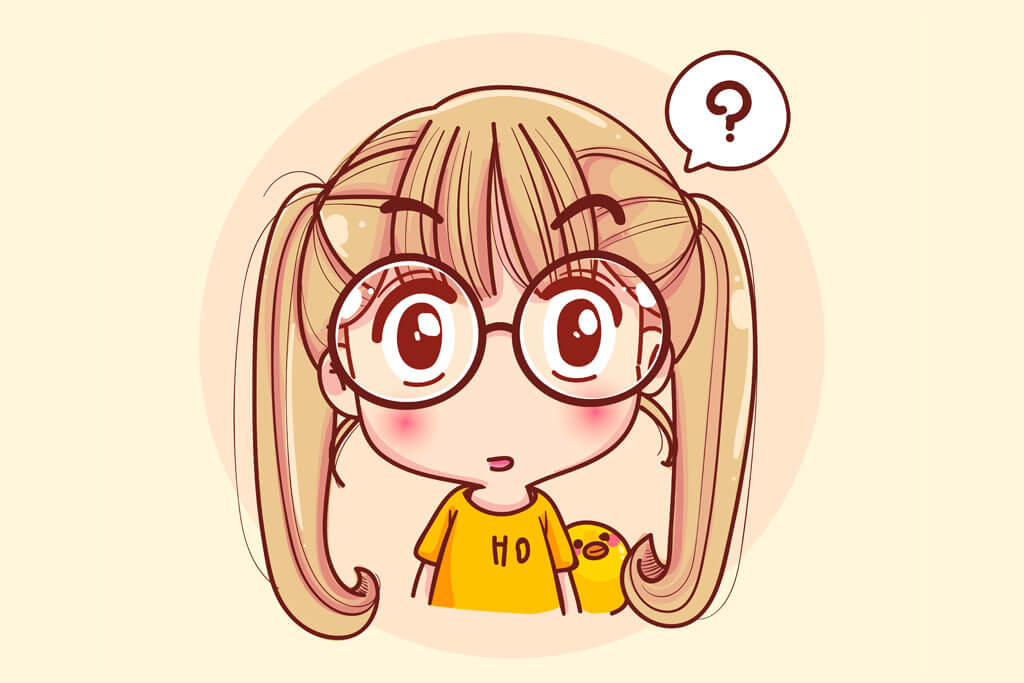There could be numerous reasons why you might want to say “I don’t know” in Japanese. Especially early on when you’re still a beginner. Being able to tell someone through speech that you don’t understand what they’re saying can save you from a lot of awkward body language.
You’d think that many simple expressions in English would translate fluidly over to Japanese. However, there are many English words and expressions that do not have an exact equivalent in Japanese.
Figuring out the most suitable Japanese translation for what you want to say can sometimes be a hassle. Like when you want to say “good luck” to someone in Japanese for example.
Luckily though, when you want to say “I don’t know” in Japanese, it isn’t that complex! There are two main ways you express your lack of knowledge in something in Japanese. These are 知らない (shiranai) and わからない (wakaranai).
In This Ultimate Guide, I break down the meaning of わからない (wakaranai), 知らない (shiranai) and discuss the differences between them. No longer will you lack a verbal response when you have no idea about something in Japanese. Instead, if you’re lucky, you might even get a 日本語上手 (nihongo jouzu) come your way!
This guide is tailored for beginners and advanced learners alike and goes beyond the bounds of just how to say “I don’t know” in Japanese. I also cover related expressions such as “I have no clue” or “I don’t get it” in Japanese. No matter the situation, formal or casual, you’ll be equipped with the knowledge of the most suitable way on how to say “I don’t know” in Japanese!
Let’s begin!
Table of Contents
I Don’t Know in Japanese
- I Don’t Know.
知らない。
shiranai.
In most contexts, when you have no clue about something, the best expression (and safest) you can use 知らない (shiranai).
知らない (shiranai) is the negative form of the verb 知る (shiru), which means “to know” in Japanese. Interestingly, the kanji, 知, which is used in both verbs means “wisdom” or “knowledge” in Japanese.
Therefore when you say 知らない (shiranai) in Japanese, you’re saying that you don’t have the wisdom or knowledge about something. 知らない (shiranai) is a very general way to say “I don’t know” in Japanese, and you can even use it in regards to people.
For instance:
- その人をあまり知らない。
sono hito wo amari shiranai.
I don’t really know that person.
That person could be anyone. When you say it like this, you’re saying you have minimal knowledge of the person, their personality etc.
Interesting uses of 知らない (shiranai) can occur during arguments. Say someone you’re engaged in conversation with is doing something you’d never thought they would do. To express your extreme shock, you could say:
- あなたをもう知らない!
anata wo mou shiranai!
I’ve no idea who you are anymore!
You can also use it in regards to objects and other things. Say I were to ask you if you know what The Legend of Zelda is for example…
- それをらない。
sore wo shiranai.
I don’t know what that is.
Essentially, when you don’t have any awareness or knowledge of a topic or thing, you can use 知らない (shiranai) to express it.
A quick thing about “I” and “you” in Japanese… pronouns in Japanese are very frequently omitted when the context is clear. Hence you’ll see them absent in the Japanese translations too.
I Don’t Know in Polite Japanese
As Japanese is a polite language that uses honorifics (keigo), you may need to conjugate 知らない (shiranai) to the polite form depending on the situation.
The polite form is a style of speech that is reserved for situations when you need to speak respectfully. These include, but are not limited to, conversations with your manager, teacher or strangers.
In the polite form, 知らない (shiranai) becomes 知りません (shirimasen). You can use it the same way you would use 知らない (shiranai) when you want to express a lack of knowledge on a topic.
- 今日は給料日ですか? 知りませんでした!
kyou ha kyuuryouhi desu ka? shirimasen deshita!
Today is payday? I didn’t know!
In this example, you’re telling the person that you had no information on the fact that it’s payday.
I Don’t Understand in Japanese
- I Don’t Understand.
わからない。
wakaranai.
わからない (wakaranai) is the second of the two most common expressions to say “I don’t know” in Japanese. Rather than just “I don’t know”, when you use わからない (wakaranai), the meaning is closer to “I don’t understand.”
Consequently, わからない (wakaranai) is reserved for mostly intellectual or emotional matters. When you say わからない (wakaranai) you’re saying that you tried to understand something, but were unable to so you don’t know.
- あなたが言ってることわからない。
anata ga itteru koto wakaranai.
I don’t know what you’re saying.
Or, you can say:
- 日本語がわからない。
nihongo ga wakaranai.
I don’t know/understand Japanese.
In both of these examples, the speaker is saying they don’t know something, but in the context of not being able to understand. Because they don’t understand, despite their efforts they just don’t know.
わからない (wakaranai), and the affirmative form わかる (wakaru), meaning to “understand” in Japanese has a nuance of the trying to relate to the speaker and their words/feelings.
During situations when you’ve tried to understand and establish a deeper connection to a person’s feelings, but are unable to, you can use わからない (wakaranai). Alternatively, if you do understand you can use わかる (wakaru), of course.
- 気持ちいわかる。
kimochi wakaru.
I understand/know how you feel.
Difference Between わからない (wakaranai) & 知らない (shiranai)
Let’s summarise the differences between わからない (wakaranai) and 知らない (shiranai).
知らない (shiranai) is purely informational. When you have not heard/seen or read about a certain topic, you can use 知らない (shiranai). It’s indicative of a lack of superficial information about something. Therefore, when you say 知らない (shiranai), you’re saying that you do not possess information or knowledge on a topic.
Whereas わからない (wakaranai) shows that you tried to understand something but were unable to. Using わからない (wakaranai) invokes a deeper meaning and has a nuance that you tried to relate and connect to the other person.
There is an exception to these rules, and I think it’s worth pointing out so you don’t accidentally say the wrong thing to someone.
If someone were to ask you, “hey is the bus stop around here?” for instance… Based on the explanations I shared above, you might think to say 知らない (shiranai). This is not necessarily wrong, it’s grammatically correct actually. But I think native Japanese speakers would prefer using わからない (wakaranai), or rather, the polite わかりません (wakarimasen) if speaking with a stranger.
This is because わからない (wakaranai) conveys a much softer “no, I don’t know” rather than 知らない (shiranai). Simply saying 知らない (shiranai) can come across as somewhat cold. In this situation, although the speaker is asking for information from you, saying 知らない (shiranai) comes across as a blunt “No, I don’t know, why would I?” kind of answer.
Instead, using わからない (wakaranai) acts as a much gentler negation that conveys something along the lines of “I’m not too sure, I’m not very acquainted with this area” kind of thing.
This is similar to how the Japanese avoid saying “no” directly to things. It’s in the culture to be polite about your response to save the other person’s face.
I Don’t Know At All in Japanese
- I have no clue.
知らん。
shiran.
During situations when you have absolutely no knowledge of an informational topic, you can say 知らん (shiran).
知らん (shiran) is a shortened version of 知らない (shiranai), meaning that it’s a very casual way of saying “I don’t know” in Japanese. They both can be used in the same contexts – those of which you have no awareness or knowledge.
The expression 知らん (shiran) also falls into the Kansai dialect, meaning that it is most frequently used around Osaka, Kyoto, and Nara regions.
- 実はその有名人がだれか知らん。
jitsu ha sono yuumei jin ga dare ka shiran.
Actually, I’ve no clue who that famous person is.
Probably more so than the full-length version, with 知らん (shiran) you can really emphasise you’re completely void of information about something. To emphasise this even further you could say:
- 何も知らん。
nani mo shiran.
I know nothing.
知らん (shiran) is also considered to be Japanese slang, so you really want to avoid using it during situations where you want to show respect.
I Don’t Get it in Japanese
- I don’t get it
わからん。
wakaran.
Similar to the relationship between 知らん (shiran) and 知らない (shiranai), わからん (wakaran) is the shortened version of わからない (wakaranai). Being a shortened version, it is considered to be Japanese slang.
So why would you use わからん (wakaran) over わからない (wakaranai)? They both convey the same meaning of “I don’t understand” in casual Japanese, so what’s the difference?
Well, apart from the former being slang, when you say わからない (wakaranai), you’re essentially saying that you’ve tried to understand (the topic) but were unable to. As a result, you don’t know.
わからん (wakaran) is also indicative of the very same thing, however, it has a bit of the finality of “it’s impossible to understand” to it.
For instance, say you’ve just started taking coding classes. You look at a huge page of Javascript, and your friend does their best to explain it to you. This is your response:
- 何これ?わからん。
nani kore? wakaran.
What is this? I don’t get it.
When you say わからん (wakaran), you’re really placing emphasis on the fact you don’t get it.
I Don’t Understand Well in Japanese
- I don’t understand well.
よくわからない。
yoku wakaranai.
At times when you are unable to understand something very well, you can use わからない.
The first part is よく (yoku), meaning “well” in Japanese. Following after is わからない (wakaranai), which we’ve already looked at above, means “don’t understand”. Consequently, the literal meaning of わからない is “I don’t understand well.”
In particular, this could mean that you were unable to relate to a piece of content, whether that be because you don’t have the same experience, or because it just doesn’t resonate with you. Whichever the reason, you just don’t understand what the thing/person is trying to say.
Perhaps you still couldn’t understand something despite the person sharing their opinion and/or trying to explain something to you. When your understanding is not adequate enough on something, you can use よくわからない (yoku wakaranai). For instance, say you’ve bought a new book.
- この本はかなりずかしくて、何度読んでもよくわからない。
kono hon ha kanari muzukashikute nando yondemo yoku wakaranai.
This book is quite complex, I don’t understand it no matter how many times I read it.
By expressing that you don’t understand something well through よくわからない (yoku wakaranai), it implies that you have tried to understand, but alas to no avail.
I Don’t Really Understand in Japanese
- I don’t really understand.
あまりわからない。
amari wakarnai.
When you have a very limited understanding of something, you can say あまりわからない (amari wakaranai).
The main nuance with あまりわからない (amari wakaranai) is that it implies that there is an absence of a considerable understanding.
What this means is that when you say あまりわからない (amari wakaranai) to someone, you’re telling them that you only understand a little or very minimal.
It does not mean that you are completely clueless, but rather that your knowledge of something is not enough for you to be able to say you understand. For instance when you say:
- 日本語を1年しか勉強しなかったので、あまりわからない。
nihongo wo ichi nen shika benkyou shinakattta node, amari wakaranai
I’ve only studied Japanese for a year, so I’m not really able to understand it.
This sentence could also mean the same as: “I’ve only studied Japanese for a year, so I only understand a little”.
Saying あまりわからない (amari wakaranai) is the same as saying you only possess minimal knowledge on something.
However, because あまり (amari) is used here, there is an emphasis placed on “not really” being able to understand something. This is because あまり (amari) in Japanese is used to express when something is not much. As an example:
- あまり甘いものを食べない。
amari amaimono wo tabenai.
I don’t really eat many sweets.
A perfect response to this might be to express your shock in the form of a “no way!“
I Have Absolutely No Idea in Japanese
- I Have Absolutely No Idea.
全然わからない。
zenzen wakaranai.
As an alternative to the slangy わからん (wakaran), you can also use 全然わからない when you’re completely at a loss.
全然わからない (zenzen wakaranai), is probably the most powerful way to convey an “I have absolutely no idea” or “I absolutely don’t understand” in Japanese. Hence, when you say 全然わからない, you’re saying that you have tried to understand something, but are utterly clueless on it.
For instance, if you completely don’t understand this guide, you could tell me:
- あなたが言ってることを全然わからない。
anata ga itteru koto wo zenzen wakaranai.
I have absolutely no idea what you’re talking about.
I hope that’s not the case, but all feedback is greatly welcomed and appreciated!
The increased emphasis of “absolutely” on this expression comes from 全然 (zenzen).
全然 (zenzen) is used in conjunction with a negative verb to convey the nuance of “not at all,” or “not in the slightest”. So when used together with わからない (wakaranai), it essentially means “I don’t understand at all” in Japanese.
You could even attach 全然 (zenzen) to the beginning of all of the expressions we’ve looked at so far to emphasise them.
Who Knows in Casual Japanese
- Who Knows.
さあ。
saa.
We often use filler words in English to fill those pauses in our speech, and Japanese is the same. Actually, さあ (saa) has a number of different meanings, and can also be used as a filler word. However, in this case, we’re going to look at how it can be used to say “who knows” in Japanese.
When you’ve been asked a question on something that you don’t know the answer to, you can reply with さあ (saa). By replying with さあ (saa), you convey the nuance of “who knows” in Japanese.
Just like how when we say “who knows” in English, we’re kind of shrugging off our opinion or knowledge on the matter, the same concept applies here in Japanese. This means that さあ (saa) is a very casual way to say “I don’t know” in Japanese with a nuance of “I’m not really bothered” kind of thing. Let’s look at a quick example of a conversation. Imagine a detective asking a suspect where the money is.
- 金はどこだ?
kane ha doko da?
Where is the money?
To which they reply:
- さあ…
saa…
Who Knows…
When さあ (saa) in a “who knows” context, it is said somewhat hesitantly with a dragged-out “aah” sound. Ever seen the Harry Potter YouTube video meme with everyone shouting out Wingardium Leviosaaa… Yeah, that “sa” is the exact same. Albeit maybe not that exaggerated, but it’s certainly very similar!
I Don’t Get You in Japanese
- I don’t get you.
理解できない。
rikai dekinai.
When you want to express to someone that you strongly can’t understand something in Japanese, you can say 理解できない (rikai dekinai). The word “strongly” here refers to how much you can’t comprehend/relate to that something.
It is a very powerful expression that expresses your incapability to understand or feel the same thing as the other person. Because of this, you can use 理解できない (rikai dekinai) to say things like “I don’t get you” or “I can’t understand you.”
- 彼を理解できない。
kare wo rikai dekinai.
I don’t get him/ I can’t understand him.
理解できない (rikai dekinai) also uses the verb できない (dekinai) which means “can’t” in Japanese. Therefore, rather than simply meaning “I don’t understand you”, 理解できない (rikai dekinai) heavily emphasises an inability to understand the person.
Saying 理解できない (rikai dekinai) to someone can come across much more personal than simply saying わからない (wakaranai).
I Don’t Know What I Should Do in Japanese
- I don’t know what I should do.
どうすればいい。
dou sureba ii.
Sometimes, when we say “I don’t know”, we want to express our concern about what to do about it a little more. We all reach times in our life when we’re not too sure what the best course of action is.
During these times, it might be best to consult a friend or family member to find an answer. When you say どうすればいい (dousureba ii) to someone, you’re conveying two things.
- You’re saying: I don’t know what I should do.
- You’re asking: What do you think I should do?
どうすればいい (dousureba ii) can be both a statement about the fact you don’t know what to do, as well as an enquiry for advice. This is because of the entities in the expression. The すれば (sureba) part of the expression is one of the four ways of saying “if” in Japanese. In this case, it is the hypothetical “if”.
Secondly the いい (ii) part means “good” in Japanese. Combining this with どう (dou) which can mean “how” or “what” we have a phrase that translates to something like “What would be good if I did it?”
Let’s take a look at an example. Perhaps you’ve landed yourself a job you’ve wanted. Congrats! But you also have the opportunity to go and study abroad for a year. You’re puzzled about what to do, so you might ask/say:
- どうすればいいのかわからない。
dou sureba ii no ka wakaranai.
I’m at a loss about what to do.
The のかわからない (no ka wakaranai) part is optional, but by saying it, you emphasise that you’re really stuck.
To really tell someone you’re completely clueless about what to do you could also say:
- 一体どうすればいい?
ittai dou sureba ii?
I’m at a loss about what to do.
I Don’t Know What I Should Do in Formal Japanese
To say “I don’t know what to do” in Japanese formally, simply attach ですか (desuka) to the end of the expression.
- どうすればいいですか。
dou sureba ii desuka.
What should I do? (I don’t know).
By attaching ですか (desuka), the question element of the expression is more direct. This is because ですか (desuka) is used to make questions in Japanese.
You can also achieve the same thing when using this phrase casually by phrasing it like a question when you say it.
I’m Not Sure in Japanese
- I’m not sure.
どうかな。
dou kana.
When we’re not confident about something, in English we often say things like “I’m not too sure”, or “I wonder”. In Japanese, we can say どうかな (dou kana) to express that same uncertainty.
Perhaps your friends are asking if you can make it to the party, or maybe you’re wondering if it’ll rain tomorrow.
When you’re questioning the legitimacy, truth or possibility of something happening, you can say どうかな (dou kana). You can also use どうかな (dou kana) to say no in indirectly in Japanese to turn down an invitation for instance.
There are two ways you can use this expression. The first is when you want to say “I’m not sure” as a general response. The second is when you want to say you’re not sure about something specifically.
An example of using どうかな (dou kana) as a general response could be when someone asks you if you’re coming to the party later. You’re not so keen so you simply reply with どうかな (dou kana), meaning “I’m not sure.”
You may have also heard どうかしら (dou kashira). The main difference between the two is that どうかしら (dou kashira) is considered to be a feminine style of speech, whereas どうかな (dou kana) is more general. Other than that, they mean the same thing!
- どうかしら.
dou kashira.
I wonder (feminine).
I Wonder If… in Japanese
When you want to express that you’re not sure about something specific, firstly we want to drop the どう (dou) part and keep かな (kana).
This is because かな (kana) is a sentence ending particle that transforms any sentence it’s attached to into an “I’m not sure if…” expression.
Let’s take a look at an example! Say if someone asks you if you think it’s going to rain tomorrow. You can say:
- 明日雨が降るかな.
ashita ame ga furu kana.
I wonder if it’ll rain tomorrow.
かな (kana) is a very flexible particle that can be attached to the end of most sentences to convey an “I wonder”.
- 彼女は本当に大丈夫かな.
kanojo ha hontouni daijobu kana.
I wonder if she is really okay.
As かな (kana) is actually a particle, it is rarely used on its own. The only time you might use it on its own is after a pause in your speech.
- 試験に合格した…かな。
shiken ni goukaku shita… kana
I wonder if… I passed the exam.
When you say it with a pause like this, your uncertainty in regard to the topic may be emphasised.
I Know in Japanese
- I know.
知ってる。
shitteru.
With all of these different ways to express that you don’t know or don’t understand something, what about when you’re on the other side of the spectrum.
That being said, when you want to say “I know” in Japanese, the most general expression is 知ってる (shitteru). You may recall from the first entry of this guide that the affirmative way to say “I know” in Japanese is the verb 知る (shiru). However, to say it naturally, we first have to conjugate 知る (shiru) into te-form. When we do, it becomes 知ってる (shitteru).
The reason we have to use 知ってる (shitteru) over 知る (shiru) is because 知ってる (shitteru) is the progressive form of 知る (shiru). This is because, when we know something, it’s a continuous thing. We don’t just know something for an instant and then forget. When we say that we know something, we’re saying that we have (and will continue to have) knowledge or information on a topic.
When we say 知ってる (shitteru) we’re saying that we possess information on the topic at hand. We can also phrase it like a question.
- 彼が来るかどうか知ってる?
kara ga kuru kadouka shitteru?
Do you know if he’s coming or not?
To say “I know” formally in Japanese, use 知っています (shitteimasu).
What If I Don’t Know How To Study More Japanese!
- どうやってもっと日本語の勉強ができるかわからない!
douyatte motto nihongo no benkyou ga dekiruka wakaranai!
I don’t know how to study more Japanese!
This brings us to the end of this ultimate guide on how to say “I don’t know” in Japanese. If you have any questions about anything covered/not covered here feel free to leave a comment or shoot me a message!
How Long Does it Take To Learn Japanese? [Ultimate Guide].
Why not have a glance at my resources on how to say various Japanese expressions in the form of ultimate guides!
I have also launched a new resource – Interactive Japanese eLearning PDFs. They’re reading practices free for you to use.
If you like The Legend of Zelda + Japanese, come and quest with me!
I hope you found this guide to be an enjoyable and helpful read!






